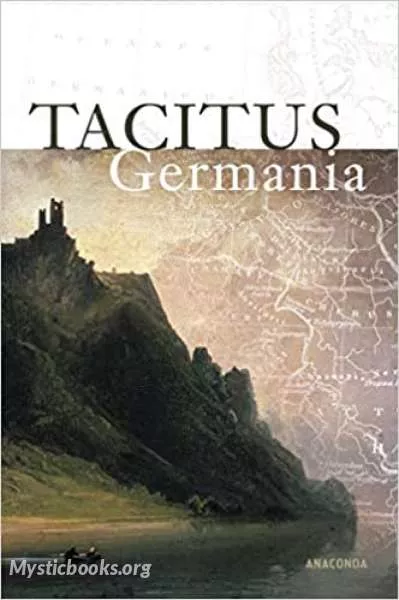
Germania
'Germania' Summary
The Germania begins with a description of the lands, laws, and customs of the Germanic people (chapters 1–27); it then describes individual peoples, beginning with those dwelling closest to Roman lands and ending on the uttermost shores of the Baltic, among the amber-gathering Aesti, the Fenni, and the unknown peoples beyond them.
Tacitus says (chapter 2) that physically, the Germanic peoples appear to be a distinct nation, not an admixture of their neighbors, since nobody would desire to migrate to a climate as horrid as that of Germania. They are divided into three large branches, the Ingaevones, the Irminones, and the Istaevones, deriving their ancestry from three sons of Mannus, son of Tuisto, their common forefather.
In chapter 4, he mentions that they all have common physical characteristics, blue eyes (truces et caerulei oculi = "sky-coloured, azure, dark blue, dark green"), reddish hair (rutilae comae = "red, golden-red, reddish yellow"), and large bodies, vigorous at the first onset but not tolerant of exhausting labour, tolerant of hunger and cold, but not of heat or thirst.
In chapter 7, Tacitus describes their government and leadership as somewhat merit-based and egalitarian, with leadership by example rather than authority, and punishments are carried out by the priests. He mentions (chapter 8) that the opinions of women are given respect. In chapter 11, Tacitus describes a form of folk assembly rather similar to the public Things recorded in later Germanic sources: in these public deliberations, the final decision rests with the men of the group as a whole.
Tacitus further discusses the role of women in chapters 7 and 8, mentioning that they often accompany the men to battle and offer encouragement. He says that the men are often motivated to fight for the women because of an extreme fear of losing them to captivity. Tacitus says (chapter 18) that the Germanic peoples are mainly content with one wife, except for a few political marriages, and specifically and explicitly compares this practice favorably to other cultures. He also records (chapter 19) that adultery is very rare, and that an adulterous woman is shunned afterward by the community regardless of her beauty. In chapter 45, Tacitus mentions that the people to the north of the Germanic peoples, the Sitones, "resemble [the Suevi Scandinavians] in all respects but one - woman is the ruling sex." "This," Tacitus comments, "is the measure of their decline, I will not say below freedom, but even below decent slavery."
Book Details
Language
EnglishOriginal Language
LatinPublished In
98 ADAuthors

Cornelius Tacitus
Roman Empire
Publius Cornelius Tacitus was a Roman historian and politician. Tacitus is widely regarded as one of the greatest Roman historians by modern scholars. He lived in what has been called the Silver Age o...
Books by Cornelius TacitusDownload eBooks
Listen/Download Audiobook
- Select Speed
Related books

朝花夕拾 (Chao Hua Si She) by Xun Lu
《朝花夕拾》是鲁迅先生以散文形式记录自己童年往事的作品集。文章以生动细腻的笔触描绘了作者记忆中的故乡、亲人、友人以及社会风俗,体现了鲁迅对传统文化和社...

Journal from Japan by Marie Stopes
Marie Stopes' 'Journal from Japan' provides a personal glimpse into her life as a pioneering scientist and activist during the early 20th century. Whi...

Aino Folk-Tales by Basil Hall Chamberlain
'Aino Folk-Tales' by Basil Hall Chamberlain offers a glimpse into the rich oral tradition of the Ainu people, the indigenous inhabitants of Japan's no...

Hellenic History by George Willis Botsford
This comprehensive textbook presents a concise overview of the development of Greek civilization, examining its political, economic, social, and cultu...

Things Seen in Spain by Catherine Gasquoine Hartley
This book is an early 20th-century travelogue that provides a glimpse into the culture, history, and people of Spain. Hartley traveled extensively thr...

History of the Conquest of Mexico by William H. Prescott
Much have I travell'd in the realms of gold,And many goodly states and kingdoms seen;Round many western islands have I beenWhich bards in fealty to Ap...

Hollywood: Its Morals and Manners by Theodore Dreiser
Serialized in Shadowland from November 1921 to February 1922, Hollywood: Its Morals and Manners is Theodore Dreiser's shocking four part expose on the...

California History -- Two Pieces by Various
This book comprises two distinct pieces exploring California's history and culture. The first, "Types of Indian Culture in California," delves into th...

Perfect Behavior by Donald Ogden Stewart
Published in 1922, "Perfect Behavior" by Donald Ogden Stewart offers a satirical and humorous look at the intricacies of social etiquette in the Roari...

World’s Story Volume II: India, Persia, Mesopotamia and Palestine by Eva March Tappan
Eva March Tappan's "World's Story Volume II: India, Persia, Mesopotamia, and Palestine" is a compilation of historical narratives, literature, and art...
Reviews for Germania
No reviews posted or approved, yet...